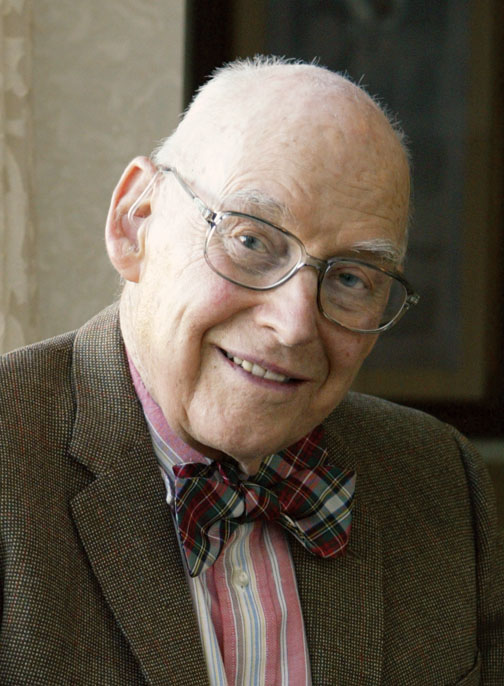Rooted in tradition, the Sachs enters its fifth decade
Each December, David Loevner ’76 and a few colleagues from the selection committee of the Daniel M. Sachs Class of 1960 Scholarship notify one Princeton senior that he or she will be traveling abroad after graduation. After sharing that happy news, Loevner adds a related message: Expect to hear from Charles Gillispie about arranging a lunch meeting.
Gillispie, an emeritus professor and a mentor of the scholarship’s namesake, has met with every Sachs scholar since the program’s beginning in 1970. But the lunch dates, he says, are less about instilling a sense of history and more about getting to know extraordinary undergraduates.
Current scholar Josh Grehan ’10 admits he was a little nervous about meeting Gillispie, a distinguished historian of science who has a towering reputation among past Sachs winners. But Gillispie’s curiosity and genuine interest put Grehan at ease. “Despite probing questions,” he says, “Charles was — and is — one of the kindest people I have ever had the pleasure of interacting with.”
The story of the Sachs scholarship covers more than half a century, and the 92-year-old Gillispie has played an important role in every phase, beginning in the fall of 1956 when he was assigned as the freshman adviser to Dan Sachs ’60. An outstanding student and remarkable athlete, Sachs would go on to Oxford as a Rhodes scholar in 1960. He planned a career in politics but died before he could pursue that dream, losing a battle with cancer at age 28.
Before his death, friends of Sachs had raised funds for a trust to support his wife, Joan, and their infant daughter. In the longer term, they planned for part of the trust to be used for a postgraduate scholarship, to give other Princetonians the kind of transformative experience that Sachs had enjoyed at Oxford. A few weeks before Sachs died, Gillispie told him about the scholarship. He approved, saying the idea had “scope.”
It would be hard to argue with his assessment: Since the first Sachs scholarship was awarded to Dennis Sullivan ’70, it has grown to become one of Princeton’s best-known honors, in part because of the accomplishments of past recipients like Supreme Court Justice Elena Kagan ’81 and Anne-Marie Slaughter ’80, the head of policy planning at the State Department and former Woodrow Wilson School dean. The scholarship also has become a source of pride for the Class of 1960, which revitalized the fund on the occasion of its 25th reunion, a time of rising tuition costs and waning investment returns.
Most Sachs scholars attend Oxford’s Worcester College, where Sachs studied, but about a quarter travel elsewhere, immersing themselves in interests that range from Chinese culture to the Bollywood film industry. Whatever their destination, scholars are encouraged to explore new paths in their time abroad. “In a way, it’s the quintessence of the Princeton experience, extended for a year or two,” says former scholar Justin Pope ’97, a reporter for the Associated Press.
Since Gillispie retired from the faculty in 1987, the Sachs selection committee has been composed primarily of former scholars. Though Gillispie no longer interviews candidates, he still reads all of the 40 to 50 applications submitted each fall.
According to Loevner, the scholarship chairman, the professor’s contributions endure in many ways, from standards that govern the selection process to the program’s strong ties with Worcester College, established on Gillispie’s visits to England. Gillispie also fosters a unique sense of community among past scholars with his annual Sachs newsletter — an eloquently composed mix of professional updates and personal news culled from correspondence throughout the year.
“Charles is never about Charles,” Loevner says. “He’s very modest about his role in this. He’s extremely proud of the outcome, though.”
Gillispie says that the scholarship has “succeeded beyond my wildest hopes.” His only unachieved ambition is to award two scholarships per year: one for travel to Oxford, the other for an independent project. “I think we’ll get there someday, fairly soon perhaps,” he says.












No responses yet